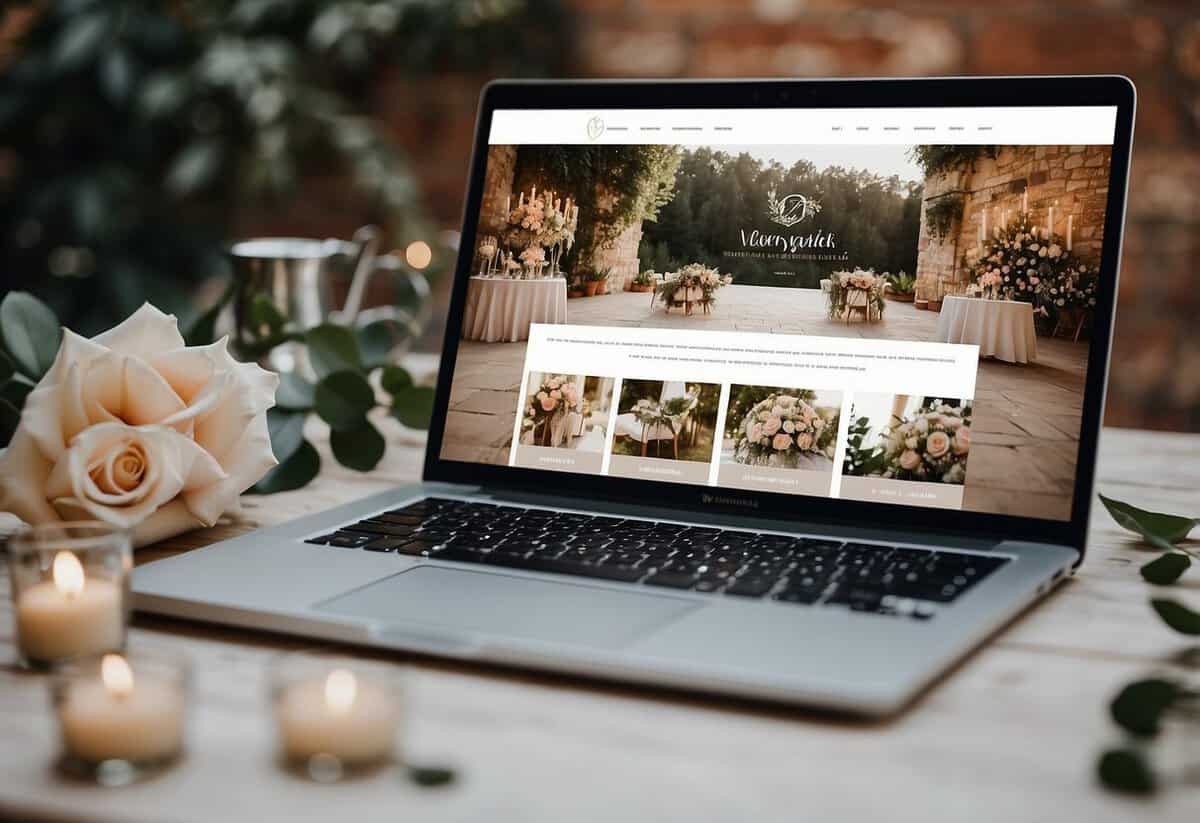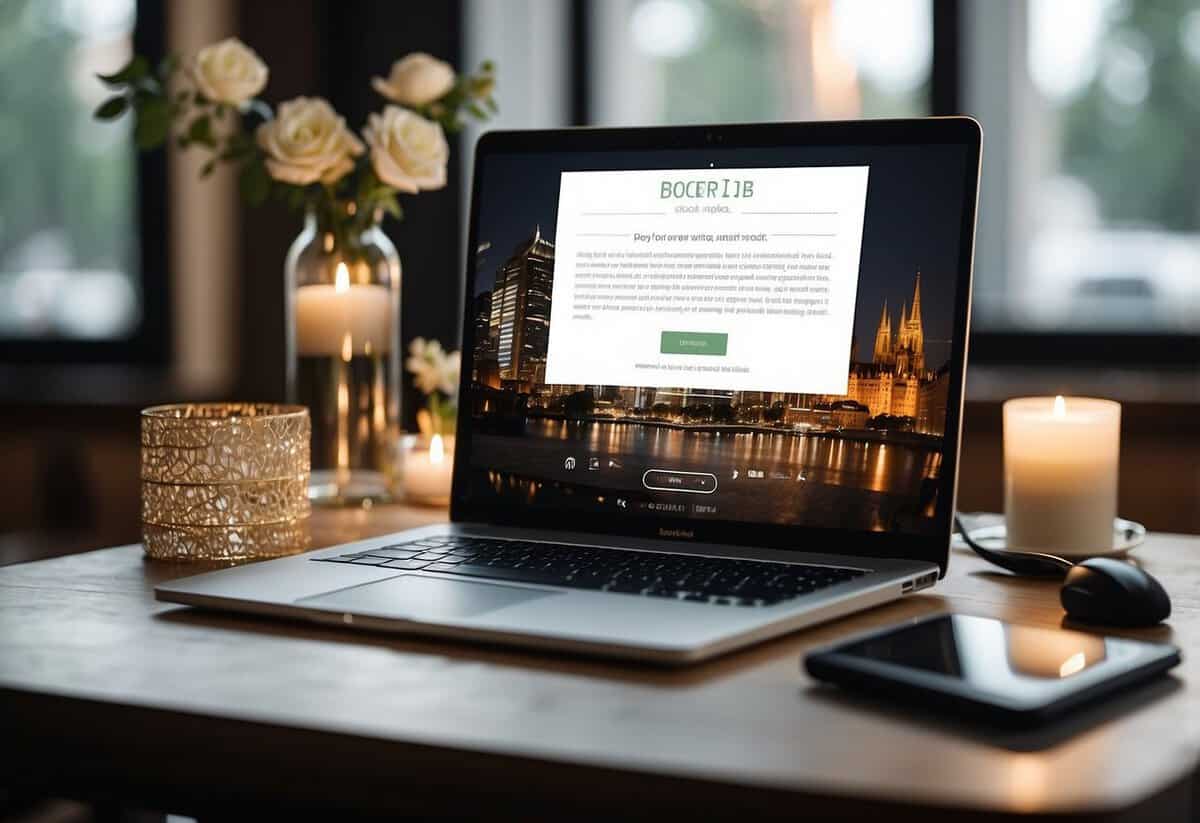Do You Need a Wedding Website for a Small Wedding? Benefits to Consider
Planning a small wedding brings its own set of unique challenges and joys. As you navigate through all the details, you might wonder if a wedding website is necessary. For many couples, a wedding website can be immensely helpful, even for a small wedding.

A wedding website allows you to share important details with your guests without constant phone calls and emails. Websites like The Knot and Zola offer easy-to-use tools and templates that make setting up a site a breeze. This can be especially handy for sharing updates, venue directions, and registry information, making your planning smoother and more joyful.
Not only that, but with platforms like Appy Couple and Minted, you can personalize your website to reflect your wedding’s theme and style. Even with a small guest list, your wedding website can help everyone feel informed and included, reducing the stress on your big day.
The Role of Wedding Websites in Small Weddings

Wedding websites can play a crucial role in small weddings by simplifying communication with guests, managing RSVPs, and personalizing your wedding story. Using a wedding website makes it easier for you to keep everything in one place while also making the experience special for your guests.
Simplifying Communication with Guests
A wedding website can make communication much easier. Instead of sending multiple emails or messages, you can update everyone at once. You can share essential details like the venue address, dress code, and schedule.
Guests can find answers to common questions without needing to reach out to you. Additionally, you can provide a section for registry information, making it simple for guests to know where to buy gifts.
Managing RSVPs and Guest Preferences
Managing RSVPs can be tricky, even for small weddings. A wedding website can help you keep track of who is coming. By using online RSVP tools, you get responses faster.
You can also collect preferences for things like meal choices or special accommodations. This makes your wedding planning smoother and more organized. It’s a convenient way to handle your guest list without needing to follow up individually.
Personalizing Your Wedding Story
Personalization adds a special touch to your wedding. Your wedding website can showcase your story—how you met, special moments, and even photos. This makes guests feel more connected to your journey.
You can also include details like the wedding date, your proposal story, and countdowns. Customizing the site to match your wedding theme makes it even more unique. It creates a memorable experience for both you and your guests.
Determining Your Wedding Website Needs

Creating a wedding website can help simplify communication, even for a small wedding. Key factors include balancing traditional methods with modern technology and considering budget and eco-friendly options.
Balancing Tradition and Tech
When planning your wedding, you might wonder if a wedding website is essential, especially if you cherish traditional wedding invitations. A wedding website adds convenience by centralizing information, such as registries and venue details.
Consider a digital RSVP option to save time and paper. This modern touch can complement traditional elements, like mailing elegant invites. A balance between both will keep all guests informed and reduce the need for follow-up calls or messages.
Using a wedding website is also helpful for a destination wedding. Guests can easily find travel information and accommodation options online, minimizing confusion.
Considering the Budget and Eco-Friendly Options
For those mindful of budget constraints, a wedding website can be a cost-effective solution. While there are expenses associated with creating and hosting a site, they may be lower than printing and mailing multiple paper invitations.
An eco-friendly approach is another benefit. By reducing the need for paper communications, you can lessen your environmental impact. Inform your guests about the eco-friendly perks of using a wedding website, which can replace or supplement traditional methods.
Digital save-the-dates or invitations can reduce waste significantly. Plus, you can update information easily without reprinting anything, saving both time and money. Combining both digital and traditional methods can cater to different guest preferences while staying within your budget.
Designing Your Wedding Website

Creating a wedding website, even for a small wedding, helps share important details and adds a personal touch. From choosing a template to adding your unique story, it’s all about making it easy and special.
Choosing a Website Template
Start by picking a template that fits your wedding style. Many wedding website builders offer various templates. Go to their homepage and look for the “Wedding Website” tab.
Consider the overall design. Do you want something classic or modern? Look at colors, fonts, and layouts. Think about how your photos will look within the template. A good template should make navigation easy for your guests.
Templates often include sections for event details, such as the date, venue, and dress code. Ensure the template you select has all the sections you need. This helps keep all the information organized and accessible.
Don’t forget about the technical aspects. Registering a custom domain makes it easy for guests to find your site. An easy-to-remember URL is crucial. Consider privacy settings to control who can see your website.
Adding Your Personal Touch
Personalization sets your wedding website apart. Start with your love story. Share how you met or a memorable moment. It makes your site more engaging and meaningful.
Use photos to make your website visually appealing. Include pictures from real weddings for inspiration. Upload your own images that reflect your journey together.
Details matter. Add specifics about the event, like the schedule, directions to the venue, and the dress code. You can also include your wedding registry and RSVP details to make it easier for guests.
Think about interactive elements. Some websites allow guests to leave messages or upload photos. This makes your site dynamic and keeps everyone engaged.
Remember, your website should reflect your personalities and the style of your wedding. Keep it simple and user-friendly to ensure a smooth experience for your guests.
Integrating Essential Wedding Details

Including key wedding details on your website helps your guests plan and enjoy your special day. Cover important areas like venue information, travel and lodging options, as well as registry and vendor details.
Venue and Travel Information
Your wedding website should clearly list the location of the wedding venue. Include the address, directions, and a map link to help guests find their way. Mention if there is on-site parking or nearby lots.
Provide travel info for out-of-town guests. Include nearby airports, train stations, and public transportation options. Adding a few tips on local attractions or restaurants can be helpful too.
Sharing accommodations details is crucial. Recommend a few hotels or Airbnbs close to the venue. If you’ve reserved a block of rooms at a discounted rate, mention that and include booking codes. This saves your guests from the hassle of searching for the best deals.
Registry and Vendor Details
On your wedding website, list your registry details. Link directly to each store’s registry page to make it easy for your guests. Mention any specific items you need or prefer. It’s also a good idea to include a variety of options and price ranges.
Include vendor details for guests who might want to know more about the event. Name the caterer if there are specific meal preferences they should be aware of, and note any dress code rules set by the venue. Listing photographers or videographers can also be fun, especially if guests want to view or share photos later.
Incorporating these details ensures all your guests feel prepared and informed. This minimizes last-minute questions and helps everyone enjoy your wedding day.
Optimizing Your Wedding Website for Guests

A well-organized wedding website helps guests find important details easily. Focus on clear navigation and accessible information to enhance user experience.
Ensuring User-Friendly Navigation
Your wedding website should be easy to navigate. First, choose a simple and clean layout. Avoid cluttered designs that could confuse visitors. Use a clear menu bar with direct links to important sections like “Wedding Details,” “RSVP,” and “Travel Plans.”
Custom URL: Create a custom URL that’s easy to remember. It could be both your names or a phrase like “YourNamesWedding.com.”
Password Protection: Consider password-protecting your site if privacy is a concern. Share the password with your guest list through your invitations.
Responsive Design: Ensure your website works well on both desktop and mobile devices. Many guests will view your site on their phones, so it needs to be mobile-friendly.
Making Information Easily Accessible
Organizing your content is key. Place crucial information where guests can easily find it. For example, the RSVP deadline should be prominently displayed and reinforced throughout your site as suggested by The Knot.
Wedding Details: Include the date, time, and venue location prominently. Use bold text to highlight these details.
Travel Plans: Provide detailed information about nearby hotels, transportation options, and parking. Including maps and links to booking sites is helpful for out-of-town guests.
Engagement Timeline: Use sections or tabs to guide guests to information about your engagement parties, bridal showers, or bachelor/bachelorette events. This makes it simpler for guests to track key dates.
Ensuring that your wedding website is thoughtfully structured and informative will ease guests’ planning and enhance their experience.

